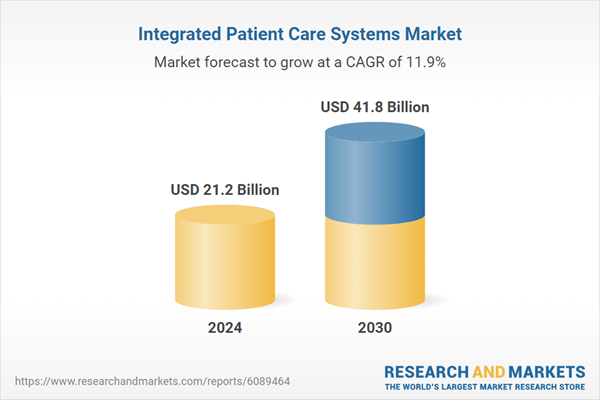Integrated Patient Care Systems Industry Report 2025:
Dublin, June 05, 2025 (GLOBE NEWSWIRE) -- The "Integrated Patient Care Systems - Global Strategic Business Report" has been added to offering.
The global market for Integrated Patient Care Systems was valued at US$21.2 Billion in 2024 and is projected to reach US$41.8 Billion by 2030, growing at a CAGR of 11.9% from 2024 to 2030.
This comprehensive report provides an in-depth analysis of market trends, drivers, and forecasts, helping you make informed business decisions. The report includes the most recent global tariff developments and how they impact the Integrated Patient Care Systems market.

Integrated patient care systems are reshaping modern healthcare by enabling seamless coordination, communication, and continuity of care across providers, settings, and specialties. These systems merge disparate health services - clinical, administrative, and behavioral - into a unified infrastructure that supports a patient-centered approach to diagnosis, treatment, monitoring, and long-term management. At their core, integrated systems reduce fragmentation by synchronizing electronic health records (EHRs), laboratory data, imaging, pharmacy services, telemedicine platforms, and care team workflows in real time.
This model addresses critical challenges in healthcare: inefficiency, redundancy, poor outcomes, and rising costs. By enabling clinicians to access holistic patient information at the point of care, integrated systems improve diagnostic accuracy, reduce medication errors, and promote evidence-based interventions. For patients, these platforms translate into smoother care transitions, reduced wait times, better communication, and more personalized treatment. As global healthcare systems evolve to prioritize chronic disease management, population health, and value-based care, the role of integrated care systems is becoming increasingly indispensable.
Modern integrated patient care systems are powered by a suite of digital technologies that enhance connectivity, data interoperability, and intelligent decision-making. Electronic health records serve as the foundation, but next-generation systems extend functionality through interoperability standards such as HL7 FHIR, allowing for real-time data exchange between hospitals, clinics, labs, and external care providers. Cloud-based architectures enable scalable, secure access to patient data across geographies and care levels.
Artificial intelligence and machine learning algorithms are being embedded to support clinical decision support, predictive analytics, and early risk identification. Integration with remote patient monitoring (RPM) tools and wearable devices allows for continuous health tracking and early intervention, particularly in chronic disease management and post-discharge care. Telehealth platforms are being linked to patient records and care plans, facilitating virtual consultations that are context-aware and documentation-ready. Mobile applications and patient portals are further empowering patients to engage in their care journey - scheduling appointments, accessing records, managing medications, and communicating with care teams.
Hospitals and health systems are the primary adopters of integrated care platforms, particularly those transitioning to accountable care models, population health initiatives, or risk-based reimbursement schemes. These systems enable organizations to coordinate multidisciplinary care across inpatient, outpatient, and home-based settings - essential for reducing readmissions, managing chronic diseases, and improving quality metrics. Primary care providers, specialty clinics, and community health networks are also implementing integrated platforms to streamline workflows and share information in real time.
Payers and government agencies are playing a pivotal role by incentivizing data sharing, quality reporting, and care coordination through policies and reimbursement structures. Integrated care systems are also gaining traction in elder care, rehabilitation centers, and behavioral health services where long-term continuity and multi-provider involvement are essential. Employers, digital health startups, and pharmaceutical companies are emerging stakeholders, leveraging these systems to support clinical trials, virtual care delivery, and employee wellness programs. As healthcare increasingly shifts toward outcome-based models, cross-functional collaboration among these players is critical to system-wide adoption.
The report analyzes the Integrated Patient Care Systems market, presented in terms of market value (US$ Thousand). The analysis covers the key segments outlined below.
Global tariff negotiations across 180+ countries are reshaping supply chains, costs, and competitiveness. This report reflects the latest developments and incorporates forward-looking insights into the market outlook.
| No. of Pages | 348 |
| Forecast Period | 2024 - 2030 |
| Estimated Market Value (USD) in 2024 | $21.2 Billion |
| Forecasted Market Value (USD) by 2030 | $41.8 Billion |
| Compound Annual Growth Rate | 11.9% |
| Regions Covered | Global |
For more information about this report visit https://www.researchandmarkets.com/r/7hcfok
About ResearchAndMarkets.com
ResearchAndMarkets.com is the world's leading source for international market research reports and market data. We provide you with the latest data on international and regional markets, key industries, the top companies, new products and the latest trends.













